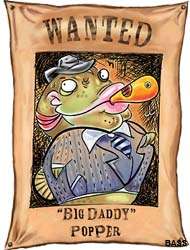
He would go on to become one of the world’s most famous bass anglers and one of the most popular television fishing personalities. Before that, though, Bill Dance was a young newlywed fishing Pickwick Lake in Alabama. He used a paddle to maneuver his johnboat along the side of a bluff, where hungry smallmouth bass chased shad.
“I had just missed a 2- or 3-pounder,” he recalled. “It had rained a lot, and I was looking at a waterfall on down the bluff.”When I looked back down at the lake, my little old popper just disappeared. I thought it was a bluegill at first.”
Instead, it was a bass that Bill Dance never will forget.
“He jumped five times,” the Tennessee angler recalled. “I saw four of them. The other time, he ran under the boat and jumped behind me before I even knew what happened.
“I saw him four times in the water and four times out of the water.
“My Uncle Ben used to smoke cigars. He looked like a walrus with one tusk because you could see about an inch and a half of the cigar sticking out of his mouth.
“When I saw that orange popper sticking out of the fish’s mouth, I thought of Uncle Ben. I could see just a little of that popper. The rest was in the fish’s mouth, including two sets of treble hooks.”
With the fish so well hooked, Dance understandably thought that he was about to land the biggest smallmouth bass of his young life, possibly even a world record. Based on mounts he had seen at a taxidermist, he was certain that this bass weighed more than 10 pounds.Unfortunately, the next time the bass ran under the boat, the line went slack, and Dance retrieved his fishless popper.He was devastated.”I wanted to catch her so bad,” he remembered. “I went back there for weeks and months. I went back early and late. I went back at night.
“I fished up and down that bluff, knowing that smallmouth bass have home-range tendencies. I went for a year, I know.”And he spoke often of the one that got away.Finally, Dance’s wife, Diane, said, “I know what that fish means to you. It will be imprinted on your mind for the rest of your life. I know how you feel, and I’m so sorry, but will you please stop talking about that fish?”Decades later, though, he still talks about it.
“People ask me about the biggest smallmouth that I’ve ever caught, and I’ll say three 8-pounders,” Dance said. “But then I’ll add, ‘Let me tell you about another one.'”Esmerelda and a bad connection
Pro or amateur, young or old, all of us who fish have hooked bass that got away. Fortunately for our mental health, we don’t remember all of them, but one or two stay with us always. Heads shaking, they leap majestically in our dreams and memories. They burn drag. They burrow into brush. They throw baits back at us and splash us back into reality with a slap of their broad tails.Often, as with Dance, we believe that those lost bass are the largest that we’ve ever hooked.Such was the case for pro angler Kathy Magers as she practiced for a tournament on Lake Fork, a fishery noted for its lunkers.”Esmerelda — as I later named her — was a huge bass that hit my lure like a small one,” Magers says. “But when she came to the surface and I saw her, I screamed with excitement, and she seemed to ‘scream’ with fright.””When she jumped, we could see that she was about a 15-pounder. My heart pounded like a big drum.”
Esmerelda followed the leap with a dive.”I pulled too hard and my line broke,” Magers says sadly. “So did my heart. I had lost the fish of my dreams.”
The veteran angler blames herself for the escape. She had been in a hurry to get on the water that day and neglected to replace old, frayed line with new.”Shame on me,” she says. “I didn’t prepare well and paid the price, but mistakes teach us life lessons, and I learned a valuable one. I’ll never fish again without having good line.
“The next time I hook Esmerelda, she’ll be mine — if only for a quick photo before I release her. Now, I’m prepared.”
Grande bass
Dave Burkhardt was prepared one fall day as he fished out of Anglers Inn on Mexico’s Lake El Salto. He used newly spooled 20-pound line manufactured by his own Triple Fish International line company.
To put things even more to his advantage, the Florida angler had plenty of experience with big bass, having boated two that weighed more than 15 pounds each and another that topped 13.
“I caught a 15-2 in a submerged orchard,” he remembered, “but I still was able to get it out of the trees. I still had some control.”
This time, though, was totally different when he set the hook into a big Mexican bass.
“This bass was totally out of control,” Burkhardt said. “It did what it wanted. I had the drag tightened all the way down, and it just kept on pulling line.”
As the bass pulled, Burkhardt kept saying, “It can’t do that. It can’t do that.”
Yet it did.
As with the 15-2, this one hit near standing timber. When it sped toward open water, the Florida angler dared to hope that he finally might conquer this still unseen monster of a largemouth.
“I thought I was home free,” he says. “But it kept going and going. Finally, it just broke off.
“The thing that I’ll never forget is my feeling of helplessness, even when it was clear (of the trees). I never gained a thing on that fish. It could have been a 20-pounder. The big two-zero.”
Hanging by a thread
Sometimes the fish we remember most wasn’t even on our hook. Such is the case for Chris Gulstad, public relations manager for Yum.
As a teenager, he was wading Minnesota’s Elk River with friends one warm June day.
“We caught about as many smallmouth bass as you can catch in a day,” he remembers. “It was as spectacular a day of fishing as I can remember. Most of the fish weighed less than 3 pounds, but one fish — the one that got way — was much larger.”
As Chris and his friend Randy waded, they felt fish bump their legs.
“In retrospect, I’m sure they were redhorse suckers,” he says. “At the time, however, we thought they were smallies that were ready to chomp.”
Randy dropped a jig-and-pig at the end of his rod tip just as another fish brushed his leg. Instantly he was locked into a fierce struggle.
“Randy probably had about 4 feet of line out, and he fought the fish as best he could,” Gulstad remembers. “He lifted her out of the water, and lo and behold, she was the biggest smallmouth I’ve ever laid eyes on.
“The big smallmouth was hanging from Randy’s jig out of the water as we looked at each other in shock. ‘How big is it? Is it a state record? Can you believe it hit like that?'”
Splash!
“She wiggled just enough to pull loose from Randy’s jig,” Gulstad recalled. “We never saw that fish again, but we’ll always remember her.”
Sometimes lost lunkers cost you money
Arkansas pro Kevin Short, meanwhile, has caught many larger bass than the one he lost last year at Lake Eufaula. He remembers this one for another reason.
“It sticks in my mind because of where I was in the standings and how I felt it could have helped me move up,” he recalled.
“I was fishing a deep stretch of grass in a creek, and I switched to a jig,” Short said. “On my first flip, a bass picked it up and started heading to deep water.
“I set the hook and knew it was a good one. She rolled up to the top, and I saw her — a largemouth in the 5- to 6-pound class.”
The bass dived, then turned and shot straight up. Following a jump, she came straight at the boat.
“As she was coming at the boat, for some reason I still can’t fathom, I tried to pull her in the same direction she was going,” said the Arkansas angler. “It was not one of my brighter moments.
“Naturally, I pulled the jig straight out of her mouth. The bad part was I knew when the jig came flying out what I had done wrong. I should have kept pressure in the opposite direction.
“I sat down in my boat in utter disgust. My amateur partner said, ‘I was not impressed with that.’
“No kidding.”
Bill Dance knows the feeling well. As memorable to him as the Pickwick smallmouth is the bass that he lost at Clarks Hill in 1973. He believes that fish would have won the Bassmaster Classic for him. Instead, he finished second to Rayo Breckenridge.
Time, though, has tempered the pain of losing both of those fish and helped Dance learn an important lesson about the value of fishing.
“It’s not the pounds or numbers of fish you catch,” he says. “Yes, you can weigh those, but they don’t come close to the memories.”
Among those memories are visions of the ones that got away.

